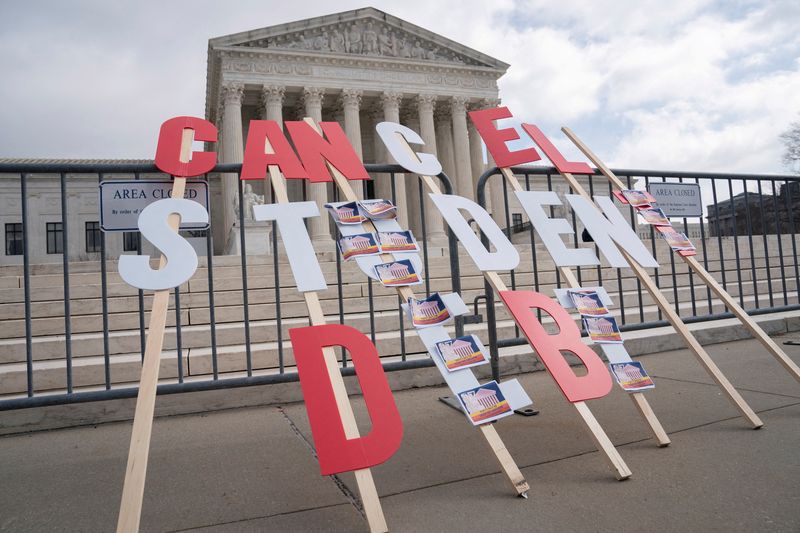By Daniel Wiessner and Nate Raymond
(Reuters) - A federal judge has dealt a setback to a legal challenge by seven Republican-led states to the latest student debt forgiveness plan from President Joe Biden's administration, removing Georgia from the case and moving it to Missouri.
U.S. District Judge J. Randal Hall, based in Augusta, Georgia, took the action on Wednesday, one day before a temporary restraining order he issued on Sept. 5 blocking the administration from proceeding with the plan - a U.S. Department of Education regulation that is still not finalized - was set to expire.
Hall ruled that Georgia, which along with Missouri had led the lawsuit, failed to show it would be harmed by the administration's plan to forgive $73 billion in student loan debt held by millions of Americans.
The judge removed Georgia from the case for lack of legal standing despite the state's claim of potential tax revenue losses, and transferred the litigation to federal court in Missouri.
"There is no indication that the rule is being implemented to attack the states or their income taxes, so any loss of ... tax revenue is incidental and insufficient to create standing for Georgia," Hall wrote.
The judge had previously ruled that Missouri did have standing to sue because that state operates a nonprofit student loan servicer that stands to directly lose millions of dollars in funding under the debt forgiveness plan.
The administration proposed the regulation in April after previous plans were blocked by the courts. Biden as a candidate in 2020 pledged to bring debt relief to millions of Americans who turned to federal student loans to fund their costly higher education. The draft regulation, according to court papers, would allow the government to provide full or partial debt relief to an estimated 27.6 million borrowers.
The states challenging the policy on Thursday asked a federal judge in Missouri to rule by Friday on whether to continue blocking the proposal. The case was assigned to U.S. District Judge Matthew Schelp, an appointee of Republican former President Donald Trump.
A Department of Education spokesperson in a statement expressed appreciation for the judge's "acknowledgement that this case has no legal basis to be brought in Georgia," and said the lawsuit reflects an effort by Republican state officials "to prevent millions of their own constituents from getting breathing room on their student loans."
"We will continue our lawful efforts to deliver relief to more Americans, including by vigorously defending these proposals in court," the spokesperson added.
The offices of the attorneys general of Georgia and Missouri did not respond to requests for comment.
Under the draft regulation, debt relief would be granted to: people who owe more than they first borrowed due to the interest that has accrued; those who have been paying off loans for at least 20 or 25 years, depending on the circumstances; and borrowers who were eligible for forgiveness under prior programs but never applied.
The fact that the rule has not yet been finalized was cited by the U.S. Justice Department in arguing there was no final agency action for the judge to review in the first place. The states argued that the administration was laying the groundwork to immediately cancel loans once the rule became final before anyone could sue to stop it.

The White House has called the current student loan system broken and has said debt relief is necessary to ensure that borrowers are not financially burdened by their decision to seek higher education.
Republicans counter that the Democratic president's student loan forgiveness approach amounts to an overreach of authority and an unfair benefit to college-educated borrowers while others receive no such relief.